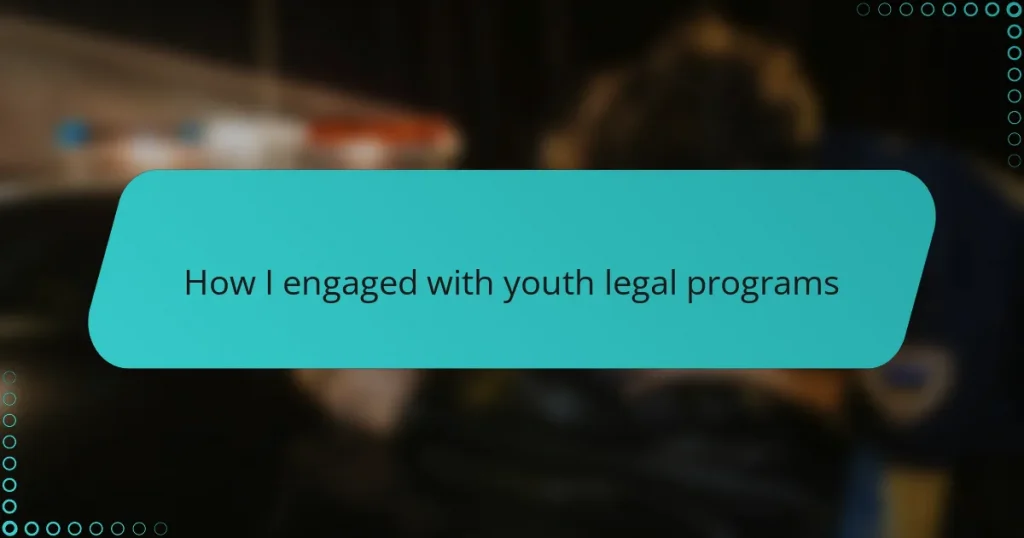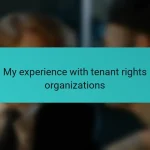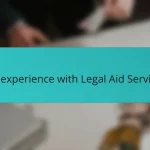Key takeaways
- Youth legal programs empower young people by providing knowledge, confidence, and advocacy skills, fostering hope and resilience.
- Key principles of effective legal advocacy include accessibility, empathy towards individuals’ struggles, and persistence in case management.
- Engaging in these programs cultivates leadership and responsibility, transforming uncertainty into empowerment and emotional strength.
- Preparation and clear communication are vital for participation, helping youth feel confident and ready to engage with their legal rights.
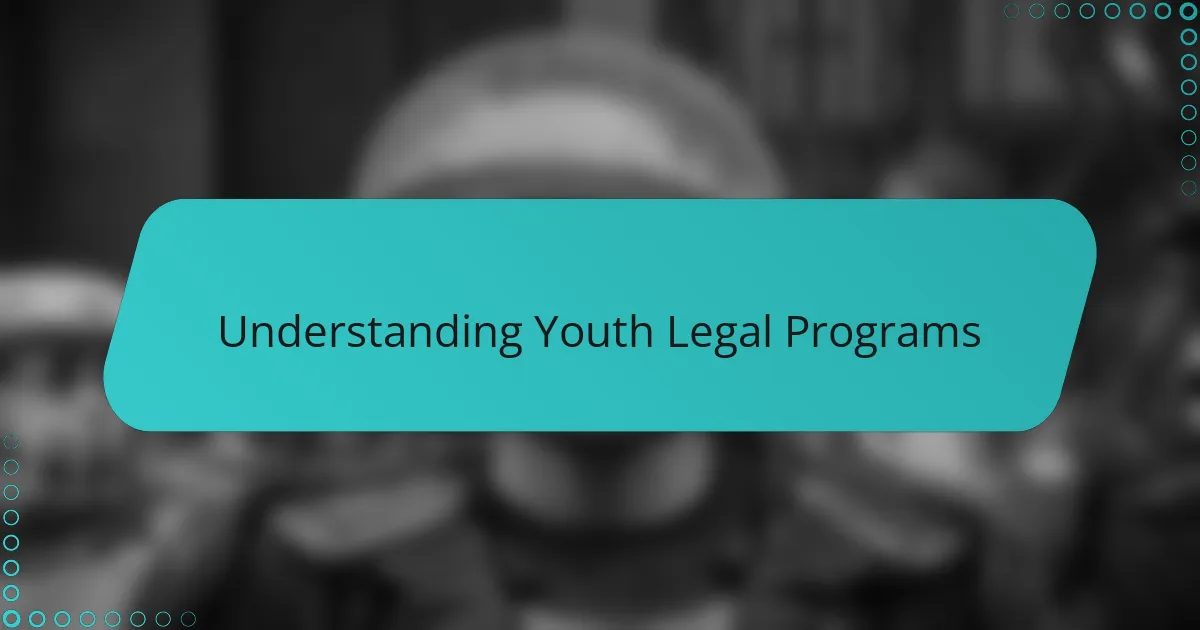
Understanding Youth Legal Programs
Youth legal programs are designed to empower young people by providing them with knowledge about their rights and access to legal resources. When I first got involved, I realized how these programs act as vital lifelines, especially for those who feel unheard or misunderstood. Have you ever considered how overwhelming navigating the legal system can be for someone just starting out?
What I found most compelling was seeing how these programs don’t just teach the law—they build confidence and encourage responsibility. Through workshops and one-on-one mentoring, young participants learn skills that go beyond legal jargon, like critical thinking and self-advocacy. It’s rewarding to watch a young person’s eyes light up when they grasp a concept that suddenly makes the world feel less intimidating.
Understanding youth legal programs means recognizing their role in shaping future advocates. They create safe spaces where youth can ask tough questions and explore solutions without judgment. Reflecting on my experience, I realize these programs are not just about legal knowledge—they’re about fostering hope and resilience in the face of challenges.
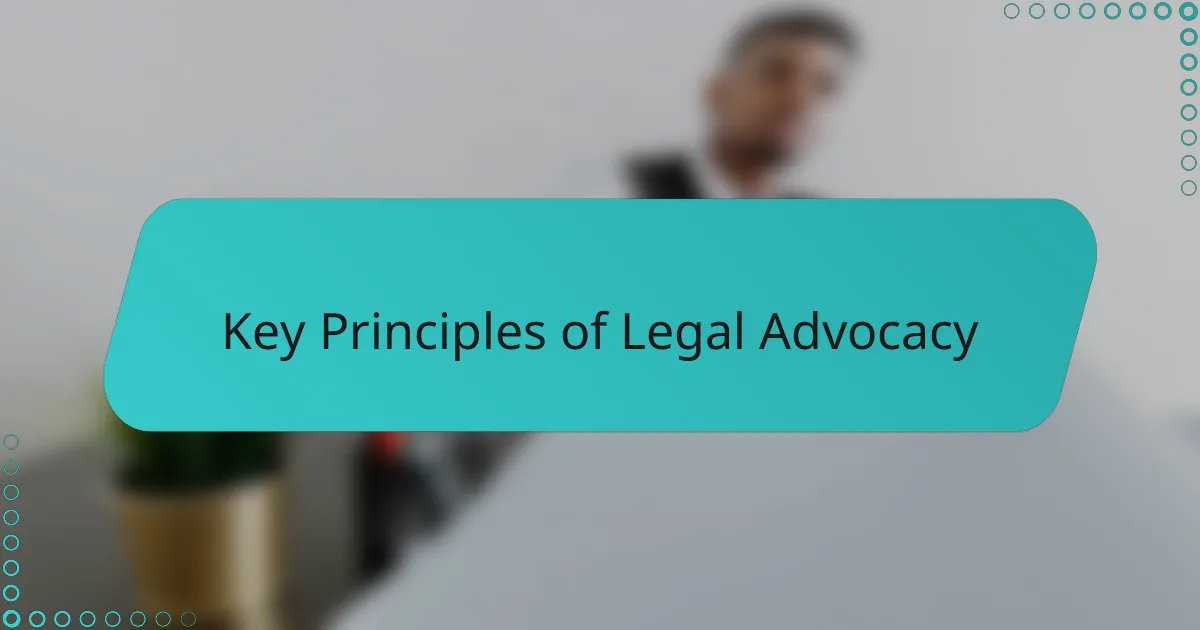
Key Principles of Legal Advocacy
Legal advocacy rests on a few key principles that became clear to me as I worked closely with youth legal programs. One of the most important is accessibility—making sure legal help isn’t a distant concept but something approachable and relevant. I remember a young participant telling me, “It’s like you made the law stop being scary.” That simple sentence captured how crucial it is to break down barriers.
Another principle I came to appreciate is empathy. Advocacy isn’t just about knowing the law by heart; it’s about understanding the person behind each case. When you listen closely, you learn that legal issues often swirl around very personal struggles. I found that creating trust made all the difference in helping youths feel safe enough to open up.
Finally, persistence stood out as a core value. Legal battles, especially for young people, can feel like uphill climbs with many setbacks. I’ve witnessed firsthand how sticking with a case, even when progress seemed slow, empowered participants to believe in themselves and the system. Have you ever experienced that sense of hope from simply not giving up? That’s the essence of effective advocacy in my view.
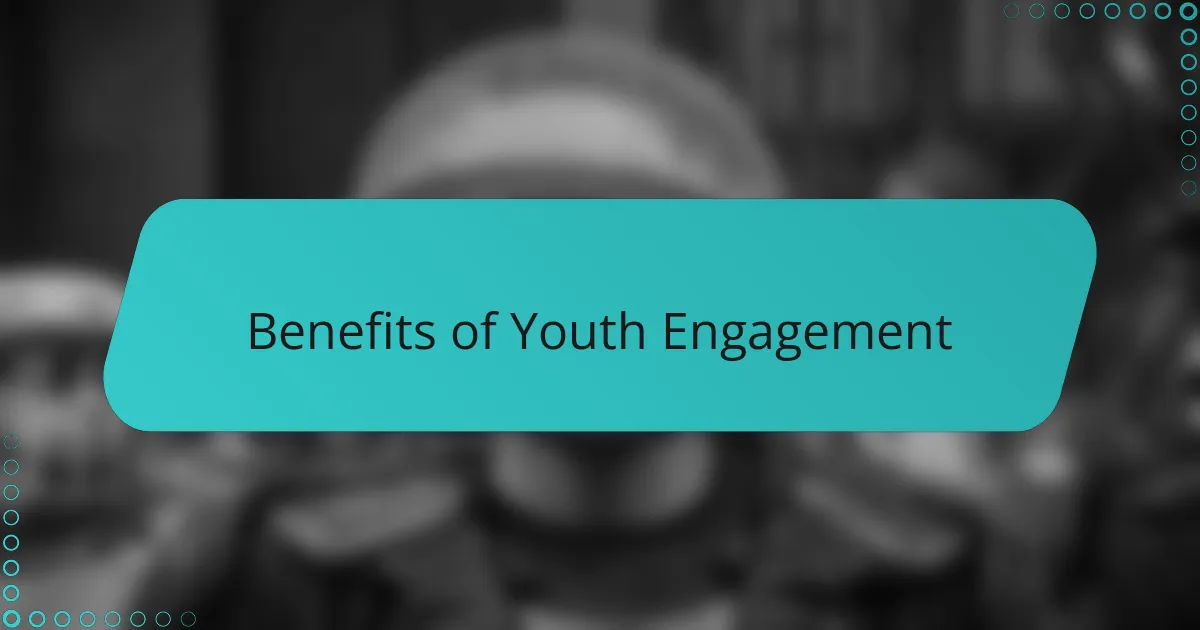
Benefits of Youth Engagement
One of the biggest benefits I noticed when engaging with youth legal programs is how they turn uncertainty into empowerment. I recall a young participant who came in feeling confused and anxious about her rights, but after just a few sessions, she was confidently explaining her situation back to me. It made me wonder—how often do we underestimate the power of knowledge to transform someone’s outlook?
Another powerful advantage is the way these programs cultivate a sense of responsibility and leadership. Watching youths take charge of their stories, advocate for themselves, and even support their peers reminded me how much potential we overlook when we don’t provide the right tools. Isn’t it incredible how a little guidance can spark a whole new level of self-respect and ambition?
Beyond the practical skills, I’ve seen firsthand how youth engagement nurtures hope and resilience. Legal challenges can be daunting, but when young people connect with empathetic mentors and a supportive community, they gain more than just legal know-how—they build emotional strength. From my experience, it’s this blend of knowledge and encouragement that truly changes lives.
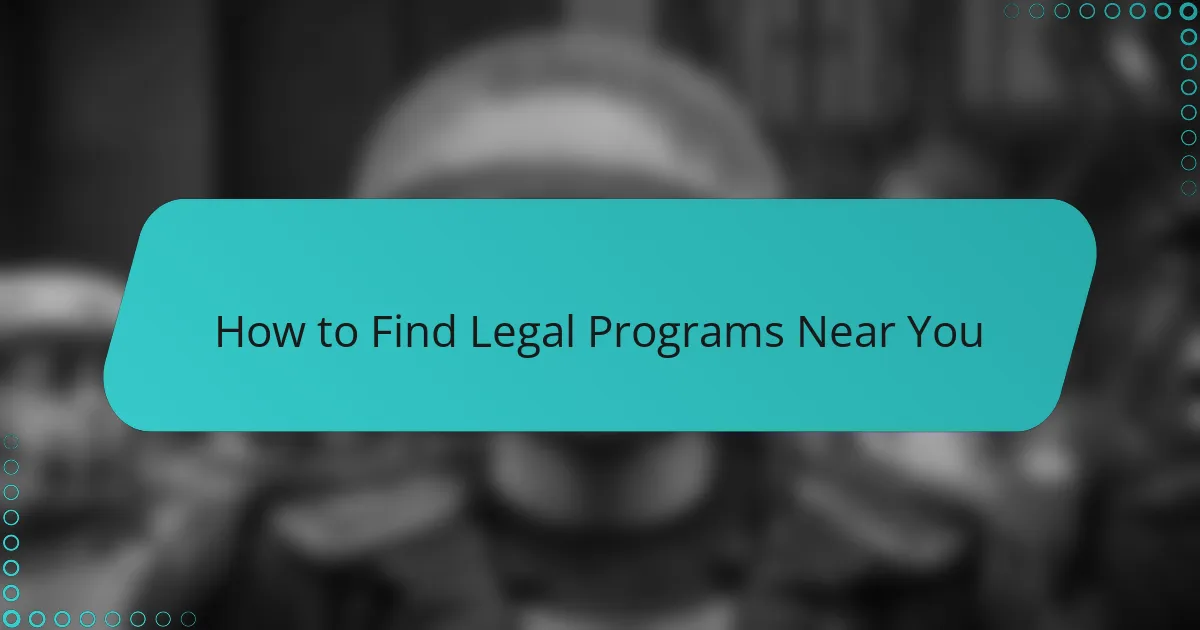
How to Find Legal Programs Near You
Finding legal programs near you doesn’t have to feel like searching for a needle in a haystack. When I first looked, I started by checking local community centers and libraries—they often post flyers or hold information sessions about youth legal resources. Have you ever been surprised by how much valuable info is right in your own backyard?
Online directories and websites dedicated to legal aid were also a game-changer for me. It was rewarding to see listings tailored by location and focus area, making it easier to narrow down options. I often wondered why I hadn’t thought to use these tools earlier—they really cut down the confusion.
Lastly, connecting with schools, youth organizations, or even trusted mentors opened doors I didn’t expect. Sometimes, it’s as simple as asking the right person, and suddenly, you’re invited to workshops or meetings that felt elusive before. Isn’t it fascinating how a small step, like a conversation, can lead to meaningful opportunities?
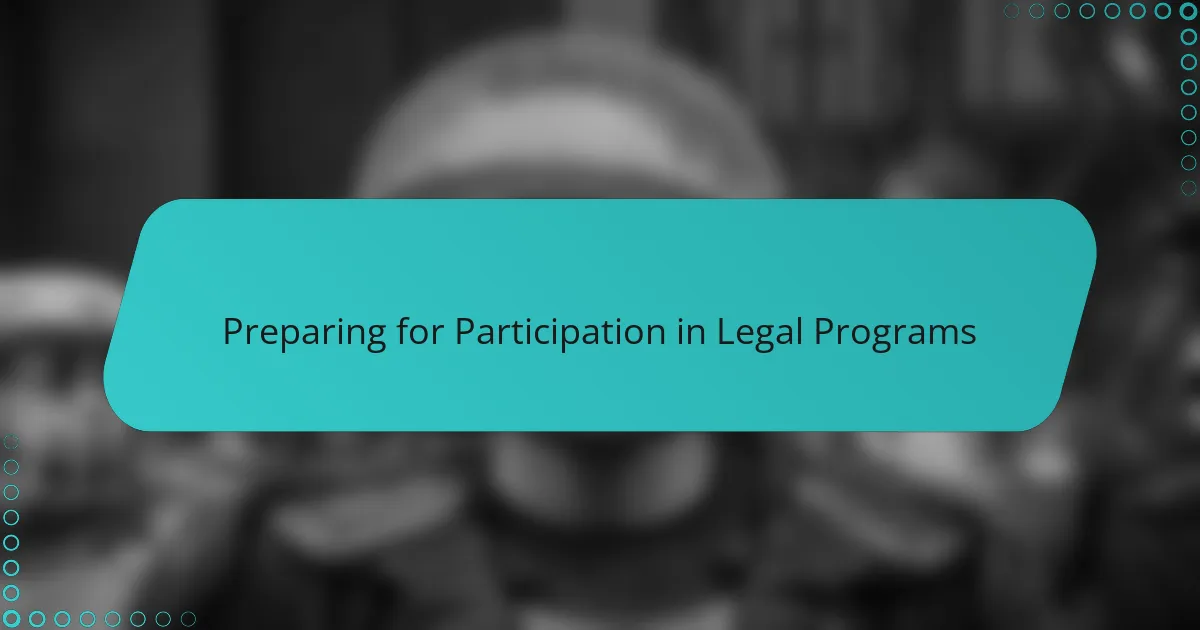
Preparing for Participation in Legal Programs
Preparing for participation in legal programs meant diving into research to understand what each program offered and how it aligned with my interests. I remember feeling a mix of excitement and nervousness as I jotted down questions to ask mentors—was I ready to speak up and share my thoughts?
I found that organizing my time and setting clear goals helped me approach the programs with confidence, rather than overwhelm. It struck me how preparation isn’t just about gathering information; it’s also about mentally gearing up to engage fully and authentically.
Have you ever noticed how taking small preparatory steps can completely change your mindset? For me, even practicing how to introduce myself or explain why I wanted to join made the process smoother and more rewarding once I got started.
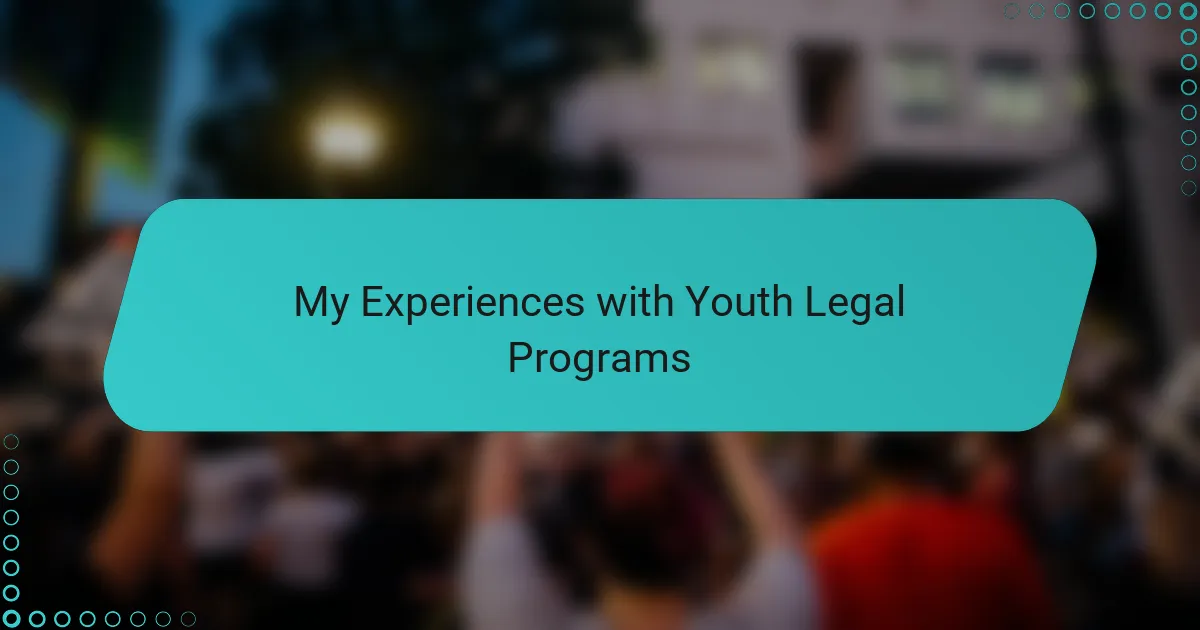
My Experiences with Youth Legal Programs
When I first joined a youth legal program, I was struck by how approachable the environment felt. It wasn’t just about learning laws—it was about connecting with mentors who genuinely cared. Have you ever experienced a space where you felt safe enough to ask the questions that really mattered? That’s what these programs gave me, and it made all the difference.
One moment that stays with me was helping a young participant prepare for a community hearing. Watching her transform from hesitant and unsure to confident and articulate was incredibly moving. It reminded me how powerful guidance and encouragement can be, especially when you’re navigating something as intimidating as the legal system for the first time.
Over time, I noticed something else—these programs don’t just teach legal concepts, they build resilience. That sense of hope you see flicker in a young person’s eyes when they realize they have a voice is something no textbook can capture. It made me realize that youth legal programs are about more than advocacy; they’re about empowering futures.
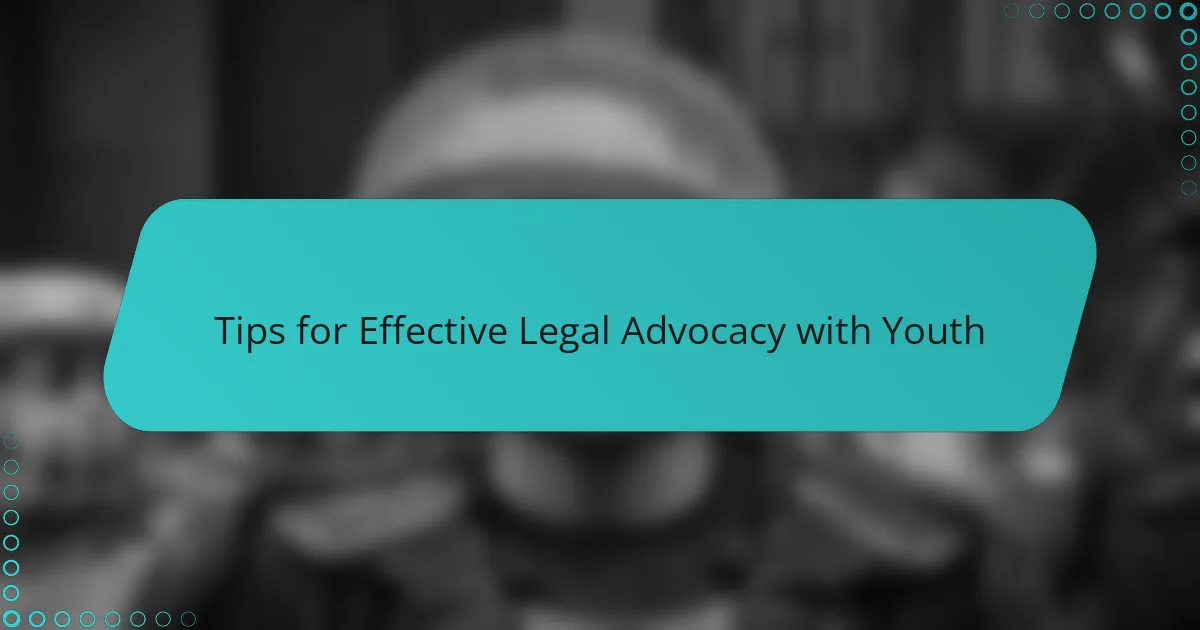
Tips for Effective Legal Advocacy with Youth
One tip that really stood out to me was the importance of listening—truly listening—to young people’s concerns without rushing to solutions. I remember a teen participant who initially seemed reluctant to share, but once I gave space and patience, she opened up about fears I hadn’t expected. Have you noticed how giving someone that quiet attention can change the whole dynamic? It’s often the first step to effective advocacy.
Another insight I’ve gained is to use clear, relatable language instead of legal jargon. When I started explaining rights in everyday terms, I saw immediate shifts in understanding and confidence. It made me think—why make things complicated when simplicity can empower? That clarity sparks not only comprehension but also trust.
Finally, I’ve learned to encourage youth to take an active role in their cases, no matter how small the action. Whether it’s writing down questions or speaking up in meetings, these moments build a sense of control and ownership. Have you ever witnessed the boost someone gets just from realizing they have a voice? To me, that’s where true advocacy begins.
